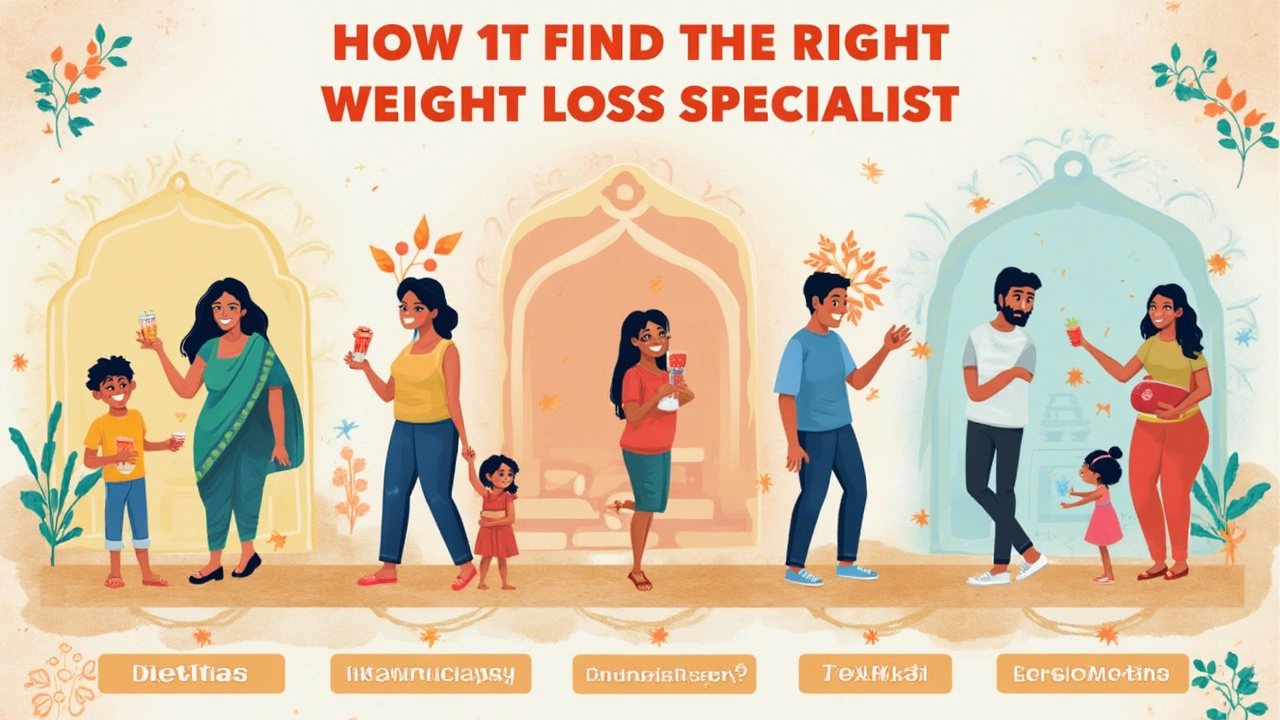Ever wondered why some people drop pounds in weight loss clinics while others feel stuck no matter what they try? Turns out, the type of doctor you see can make a big difference. It's not just about someone handing you a diet chart—it's about matching you with real medical know-how for your specific situation.
A lot of folks start with their regular family doctor, which works if you want basic advice or to rule out any serious health problems. But if you're dealing with stubborn weight, odd cravings, health risks, or you've tried every trend out there, you probably need a specialist. Not every "weight loss doctor" is the same. Some will dig into your medical history, run lab tests, look at your hormones, or help you set up a personalized plan that actually fits your lifestyle.
The best advice? Don’t settle for generic plans or miracle cures. If you’ve bounced from app to app, or quit every gym membership in frustration, the right specialist can save you time and a lot of stress. Let’s break down who’s who in the weight loss world, and how to pick the one that’ll actually make a difference for you.
- Why Your Doctor Choice Matters
- Primary Care: The Usual Starting Point
- Bariatricians and Obesity Specialists
- Endocrinologists: When Hormones Are the Problem
- Dietitians and Nutritionists: Facts vs. Fads
- Making the Most of Your Doctor Visit
Why Your Doctor Choice Matters
Picking the right doctor for your weight loss journey isn’t just a box to tick—it can literally change everything about your results. Not all doctors know the ins and outs of modern weight management, and the wrong fit can leave you spinning your wheels. Here’s why it’s such a big deal.
First, weight loss is rarely as simple as burning more calories than you eat. Stuff like genetics, stress, sleep, hormones, and even some medications all play a role. Some doctors specialize in treating these underlying causes rather than just telling you to "eat less, move more." That personalized approach matters, especially if things haven’t worked out before.
The type of doctor you choose affects:
- The kind of medical tests and assessments you get
- Access to prescription weight loss medications, if needed
- How they deal with chronic issues like diabetes or PCOS
- Whether surgery is even discussed as an option
- The support you’ll get with food, fitness, and even mental health
For example, a weight loss doctor (also called a bariatrician) will look at things like body composition, metabolic rate, advanced blood work, and even your lifestyle habits in way more detail than a regular check-up. They keep up with the latest guidelines and research.
Check out this quick comparison of what different types of providers usually offer at weight loss clinics:
| Provider Type | What They Offer | Best For |
|---|---|---|
| Primary Care Physician | General health check-up, basic dietary advice, referrals | First-time weight loss talks, overall health review |
| Bariatrician | Medical weight management, prescription meds, detailed assessments | Complex, stubborn weight issues, medical management |
| Endocrinologist | Hormone testing, thyroid issues, diabetes management | Suspected hormonal causes, diabetes, thyroid problems |
| Registered Dietitian | Personalized meal plans, nutrition counseling | Daily food support, practical eating tips |
One more thing—according to a 2024 survey by the Obesity Medicine Association, patients under care with a certified obesity specialist were twice as likely to keep off at least 10% of their starting weight for a year compared to those going it alone. When you line up with the right expert, the odds move in your favor.
Primary Care: The Usual Starting Point
If you’re serious about losing weight, your regular doctor—the one you see for checkups, flu shots, and mystery coughs—is usually the first stop. They know your health history and can spot if something medical is driving your weight. This is also the person who can quickly check things like blood pressure, cholesterol, and blood sugar.
You might not think of your primary care doc as a weight loss doctor, but they play a huge role in this journey. They’ll often ask about what you’ve tried, look for medication side effects, talk family history, and check for things like thyroid issues that can mess with your weight.
Here’s what usually happens at a primary care visit for weight:
- They’ll review your full medical history, including weight patterns and related health problems.
- They run basic blood work (think cholesterol, blood sugar, thyroid).
- You’ll get checked for issues like sleep apnea, high blood pressure, and diabetes—common in people carrying extra weight.
- They’ll talk about what daily life looks like for you: stress, sleep, eating habits, and activity level.
- They’ll suggest realistic, science-backed changes: swap sugary drinks, increase protein, add simple activity.
Some primary care doctors offer prescription medications for weight loss or can refer you to nutrition counseling. But if you need more than just the basics—like if you have a lot of weight to lose, or medical complications—they’ll send you to a specialist, such as a bariatrician or dietitian.
Wondering how common these health checks are for people with excess weight? Here’s a snapshot:
| Checkup | Percent of Adults with Obesity Getting This Check |
|---|---|
| Blood Pressure | 90% |
| Glucose/Diabetes Screening | 68% |
| Cholesterol Test | 74% |
| Thyroid Function | 41% |
Bottom line: your primary care doc is like home base. Start here to make sure nothing serious is blocking your progress. If things get complicated, you’ll get pointed in the right direction fast.
Bariatricians and Obesity Specialists
If you're serious about medical weight loss, a weight loss doctor—specifically a bariatrician or an obesity medicine specialist—might be your best bet. These doctors go through extra training to treat obesity and related issues, not just hand out diet plans. The American Board of Obesity Medicine only certifies doctors who’ve finished hundreds of hours in obesity science and passed tough exams. This makes them much better equipped than your average physician to handle weight issues that seem impossible to crack.
Bariatricians often use a mix of techniques. They look at your overall health, run lab tests, and might even use medications approved by the FDA to help you lose weight. They're not the doctors who do surgery (that’s a bariatric surgeon)—their job is to help you avoid it if possible. If things get tough, though, they can refer you for surgery and support you before and after the process.
- They treat medical causes for weight gain like PCOS, thyroid problems, or genetic factors.
- They create tailored plans with realistic, science-backed strategies—not just "eat less, exercise more."
- Many use the latest meds such as semaglutide (Ozempic, Wegovy) or tirzepatide (Zepbound), often with close monitoring.
- They’re big on tracking: expect regular check-ins, body composition scans, and tweaks if something’s not working.
Need proof that specialists make a difference? Obesity medicine clinics, according to a 2023 survey by the Obesity Society, reported their patients lost an average of 10% of their starting body weight in a year. That’s double what most people manage with self-help diets.
| Bariatrician/Obesity Specialist | What They Do |
|---|---|
| Bariatrician | Treats obesity with non-surgical methods: medication, nutrition, behavioral therapy |
| Obesity Specialist | Board-certified in obesity medicine; focuses on long-term medical management and prevention |
| Bariatric Surgeon | Performs weight loss surgeries like gastric bypass and sleeve gastrectomy |
When regular diets stop working or your doctor shrugs off your struggles, seeing one of these specialists might finally get you real results. Before booking, ask if they’re board-certified in obesity medicine and what kind of monitoring or medication support they offer. This stuff matters and can completely change your outcome.

Endocrinologists: When Hormones Are the Problem
If you’ve been busting your gut with diet and exercise but still can’t lose weight, your hormones might be the issue. That’s when seeing an endocrinologist makes sense. These doctors specialize in hormone stuff, so they know all about how things like thyroid, insulin, and cortisol can mess with your weight.
People with thyroid problems, like hypothyroidism, often gain weight even if they eat healthy and stay active. Diabetes and conditions like polycystic ovary syndrome (PCOS) can also make losing weight extra tough. Your family doctor might spot a problem, but an endocrinologist digs deeper. They run tests most other doctors won’t think of, and they know which treatment actually works for hormone-related weight issues.
The process usually looks like this:
- They’ll start with a detailed medical history and ask about your symptoms—think tiredness, hair loss, mood swings, or sudden weight gain.
- Next comes blood work to check things like thyroid hormone, insulin, cortisol, and sometimes reproductive hormones.
- They’ll explain what’s going on in plain language and suggest treatments—medication, diet tweaks, or other medical therapies.
Here’s a quick overview of how some hormone disorders connect to weight issues:
| Hormone Disorder | Symptoms | Potential Weight Impact |
|---|---|---|
| Hypothyroidism | Fatigue, cold intolerance, dry skin | Slowed metabolism, weight gain |
| PCOS | Irregular periods, acne, excess hair | Insulin resistance, abdominal fat |
| Cushing’s Syndrome | Easy bruising, muscle weakness | Fat gain in face and belly |
| Diabetes Type 2 | Increased thirst, frequent urination | Insulin resistance, stubborn weight |
If your weight gain is sudden, unexplained, or comes with other weird symptoms, don’t ignore it. An endocrinologist from a weight loss doctor team will get to the bottom of things way faster than trying random diets. If you’re tired of guessing and want real answers, this is the doc you need on your side.
Dietitians and Nutritionists: Facts vs. Fads
Let’s be real—nutrition advice is everywhere. One day carbs are the enemy, the next day you should eat more of them. That’s where seeing a dietitian or nutritionist comes into play. These folks are trained to cut through the noise.
Registered dietitians (RDs) have a legit degree and passed a national exam. They can handle medical issues tied to food, like diabetes or heart disease, and set up plans that match your health needs. Nutritionists, on the other hand, aren’t always certified—so always check their background before you trust their advice. Some states don’t even regulate who can call themselves a “nutritionist.”
If you’ve ever fallen for a fad diet pushed online—keto one month, juice cleanse the next—know this: dietitians deal in science, not trends. They look at the real data, ask about your habits, and tweak your plan so it’s doable long-term. Plus, they won’t recommend coconut oil for every problem just because it’s trending on Instagram.
- Weight loss doctor referrals often send you to an RD for lasting change, not just quick fixes.
- Dietitians can read your lab results, spot vitamin or mineral problems, and explain why your last diet failed.
- They consider things like food allergies, culture, budget, and even time—no “one-size-fits-all” plans here.
Want some quick numbers? Check out this table:
| Professional | Training | What They Do |
|---|---|---|
| Registered Dietitian (RD) | Bachelor’s degree, supervised practice, national exam | Medical nutrition therapy, individualized plans, manage health conditions |
| Nutritionist | Varies (from self-taught to advanced degree) | General nutrition advice; may not be qualified for medical cases |
According to the Academy of Nutrition and Dietetics, people who work with RDs are much more likely to keep weight off compared to those who try random diets from social media. That’s probably because RDs don’t just talk about food—they help change behavior. They’ll also help bust myths, like “more protein will fix everything,” or “you can’t lose weight if you eat past 7 p.m.”
If you want real results, not gimmicks, ask your clinic or primary care doctor for an RD referral. A good dietitian won’t just tell you what to eat—they’ll actually teach you how to make it last, even when life gets chaotic.
Making the Most of Your Doctor Visit
Walking into a weight loss appointment can feel awkward, but you’ll get more out of it if you show up prepared. Doctors appreciate patients who come with a clear picture of what’s going on. Make it easy for them to see where you’re coming from, and you’ll leave with way better advice.
Before your visit, write down your current habits—what you eat, how often you move, sleep patterns, and any weight changes lately. List out any meds or supplements you take. If weight gain runs in your family or you’ve got conditions like thyroid issues or diabetes, bring that up right away. The more straight-up you are, the faster your doctor can get to the root of things.
- Bring a food and activity journal covering at least one week.
- Note any weight loss methods you’ve already tried and how your body responded.
- Be honest about challenges—like stress eating, late-night snacking, or emotional ups and downs.
- Jot down what you want out of your visit. Is it a better weight loss doctor, an actual diagnosis, or support with meal planning?
When you’re there, don’t hold back your questions. Some good starters:
- Are there medical causes for my weight struggles?
- Is my metabolism or thyroid playing a part?
- Would bloodwork or other tests help?
- Do you think medication or surgery could be right for me down the line?
Doctors in weight loss clinics sometimes run the following tests to get the full story:
| Test | What It Checks |
|---|---|
| Blood Sugar (A1C) | Checks for diabetes or prediabetes |
| Thyroid Panel | Rules out thyroid problems |
| Lipid Panel | Looks at cholesterol and heart risk |
| Liver Function | Monitors for fatty liver or issues with meds |
| Hormone Levels | Detects problems like PCOS or low testosterone |
Once you’ve got a plan, get it in writing. Ask for clear steps, diet ideas that match your lifestyle, and details on how to follow up. If you’re not sure about something, ask until it’s crystal clear—no shame in wanting real-world advice that fits your day-to-day.
Bottom line: Be upfront, ask everything that’s on your mind, and partner up with your doctor. The more you put into your visit, the better the results you’ll get out of it.








